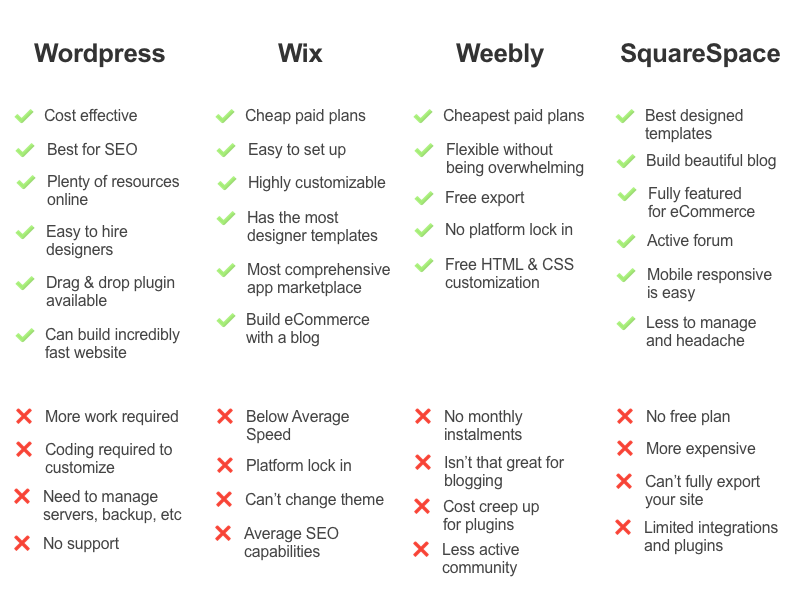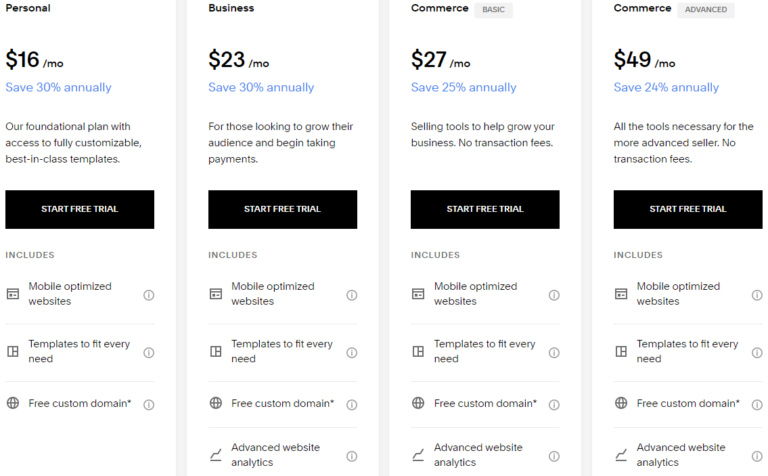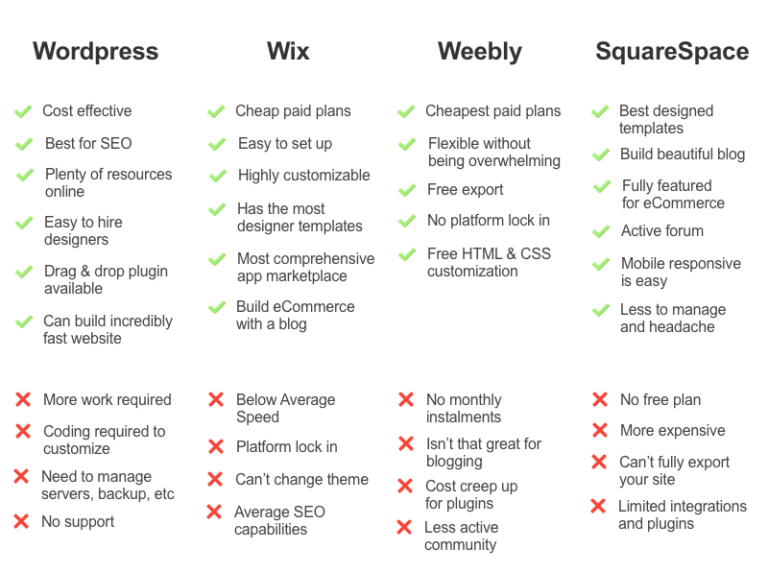Squarespace Vs Wix Vs WordPress
Choosing the right website builder is crucial for your online presence. Squarespace, Wix, and WordPress are top contenders.
In this blog post, we’ll explore the differences between Squarespace, Wix, and WordPress. Each platform offers unique features and benefits tailored to different needs. Squarespace is known for its sleek templates and ease of use. Wix provides flexibility with its drag-and-drop interface.
WordPress stands out with its powerful customization and vast plugin library. This comparison will help you understand which platform suits your needs best. Whether you’re a small business owner, blogger, or e-commerce entrepreneur, you’ll find valuable insights here. Let’s dive in and find the perfect fit for your website!
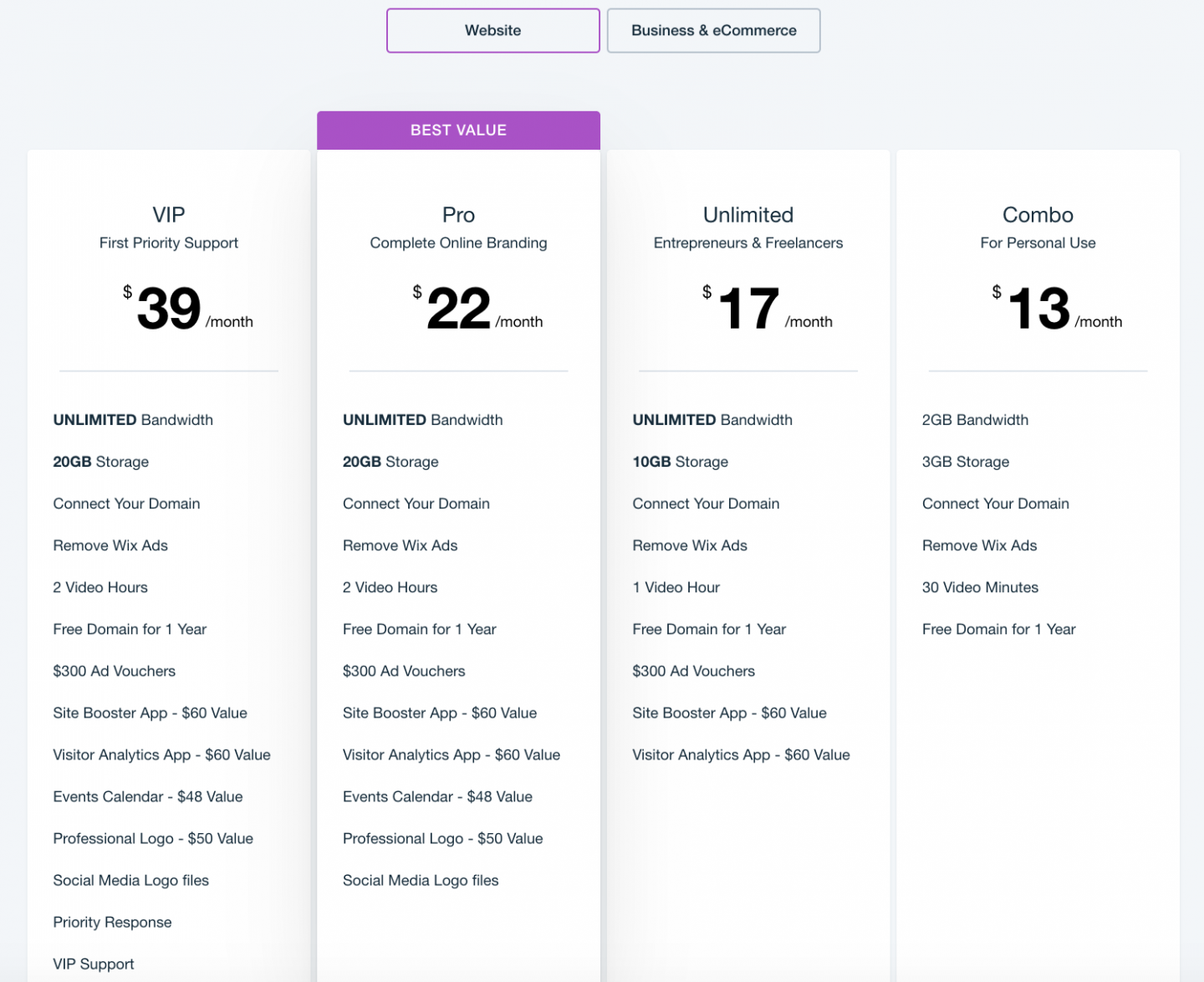
Credit: www.nerdwallet.com
Introduction To Website Builders
Website builders have changed the way people create websites. They offer easy-to-use tools for anyone to build a site, regardless of technical skill. Whether for a business, blog, or personal project, these platforms simplify the process.
Why Choose A Website Builder?
Website builders are popular for many reasons:
- Ease of Use: Most platforms offer drag-and-drop tools.
- Cost-Effective: Generally cheaper than hiring a web developer.
- Quick Setup: Get your site online in hours, not days.
- Customization: Many templates and design options available.
These benefits make website builders an attractive option for beginners and small business owners. You don’t need coding skills to create a professional-looking website.
Key Players In The Market
Several companies dominate the website builder market. Here are three key players:
| Platform | Key Features | Ideal For |
|---|---|---|
| Squarespace |
|
Creative professionals, small businesses |
| Wix |
|
Beginners, small businesses |
| WordPress |
|
Bloggers, large-scale websites |
Each platform has unique strengths. Squarespace is known for its stunning designs. Wix offers unmatched ease of use. WordPress provides powerful customization options.
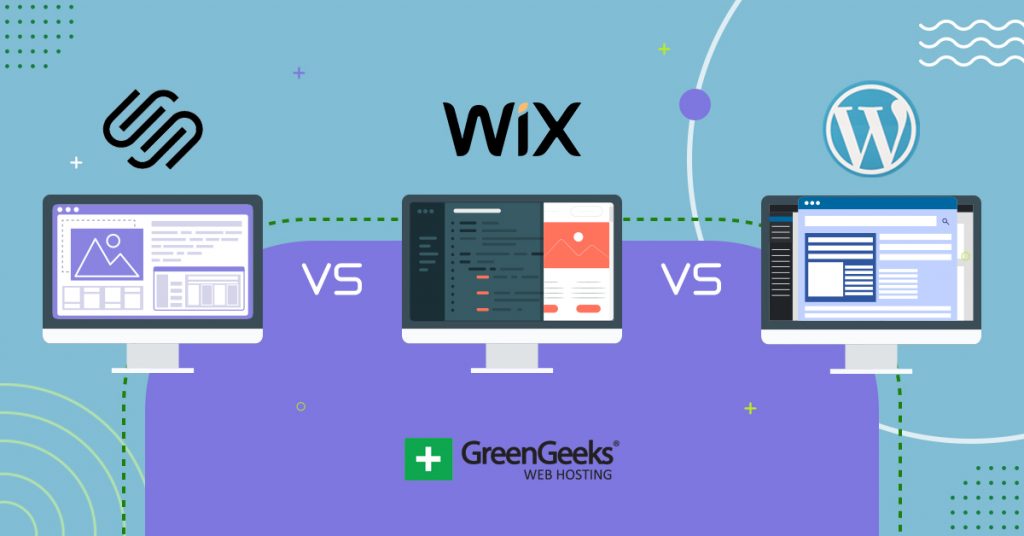
Credit: www.greengeeks.com
Squarespace: Strengths And Weaknesses
Squarespace is a popular website builder known for its sleek design and user-friendly interface. It offers several features that cater to both beginners and experienced users. However, like any platform, it has its strengths and weaknesses.
User Experience
Squarespace provides an intuitive user experience. Its drag-and-drop interface makes it easy for users to build their websites. No coding skills are required. The platform offers various templates, all of which are responsive and modern.
One significant strength is the integrated tools. Users can manage everything from SEO to eCommerce within the platform. It simplifies the process, making it less overwhelming for beginners.
However, some users find the learning curve steep. Advanced features and customization options can be complex. It might take some time to get familiar with all the features.
Design Flexibility
Squarespace is known for its design flexibility. Users can choose from a wide range of templates. Each template is customizable, allowing for a unique website design.
All templates are mobile-friendly. This ensures your website looks good on any device. Users can also use custom CSS for more advanced design needs. This offers more control over the site’s appearance.
On the downside, the customization options are limited compared to other platforms like WordPress. Users may find it restrictive if they need extensive design changes.
Pricing Plans
Squarespace offers several pricing plans to suit different needs. Below is a table summarizing the plans:
| Plan | Monthly Cost | Features |
|---|---|---|
| Personal | $12 | Basic website features, SSL, 24/7 support |
| Business | $18 | Advanced features, eCommerce, marketing tools |
| Basic Commerce | $26 | No transaction fees, advanced eCommerce |
| Advanced Commerce | $40 | All features, advanced shipping, subscriptions |
Squarespace’s pricing is competitive. It includes hosting and SSL certificates. This makes it a one-stop solution for many users.
However, it might be more expensive than some competitors. Especially for users who need advanced features. Budget-conscious users might find it less appealing.
Wix: Pros And Cons
Wix is a popular website builder that offers a range of features for beginners and professionals alike. Understanding its pros and cons can help you decide if it’s the right choice for your website needs.
Ease Of Use
Wix is known for its user-friendly interface. It uses a drag-and-drop system that is intuitive. You can easily add text, images, and other elements. No coding knowledge is required. This makes it accessible for beginners. The platform offers guided tutorials and support, easing the learning curve.
Customization Options
Wix provides a variety of templates to choose from. You can customize these templates to suit your brand. The design options are quite flexible. However, once you select a template, you cannot switch to another without starting over. This limitation can be a drawback for some users. Advanced customization is also limited compared to other platforms.
Cost Structure
Wix offers several pricing plans. These range from free to premium options. The free plan includes Wix ads on your site. To remove these ads, you need to upgrade to a paid plan. Paid plans also offer more features and storage. The costs can add up if you require advanced features. Always consider what features you need before choosing a plan.
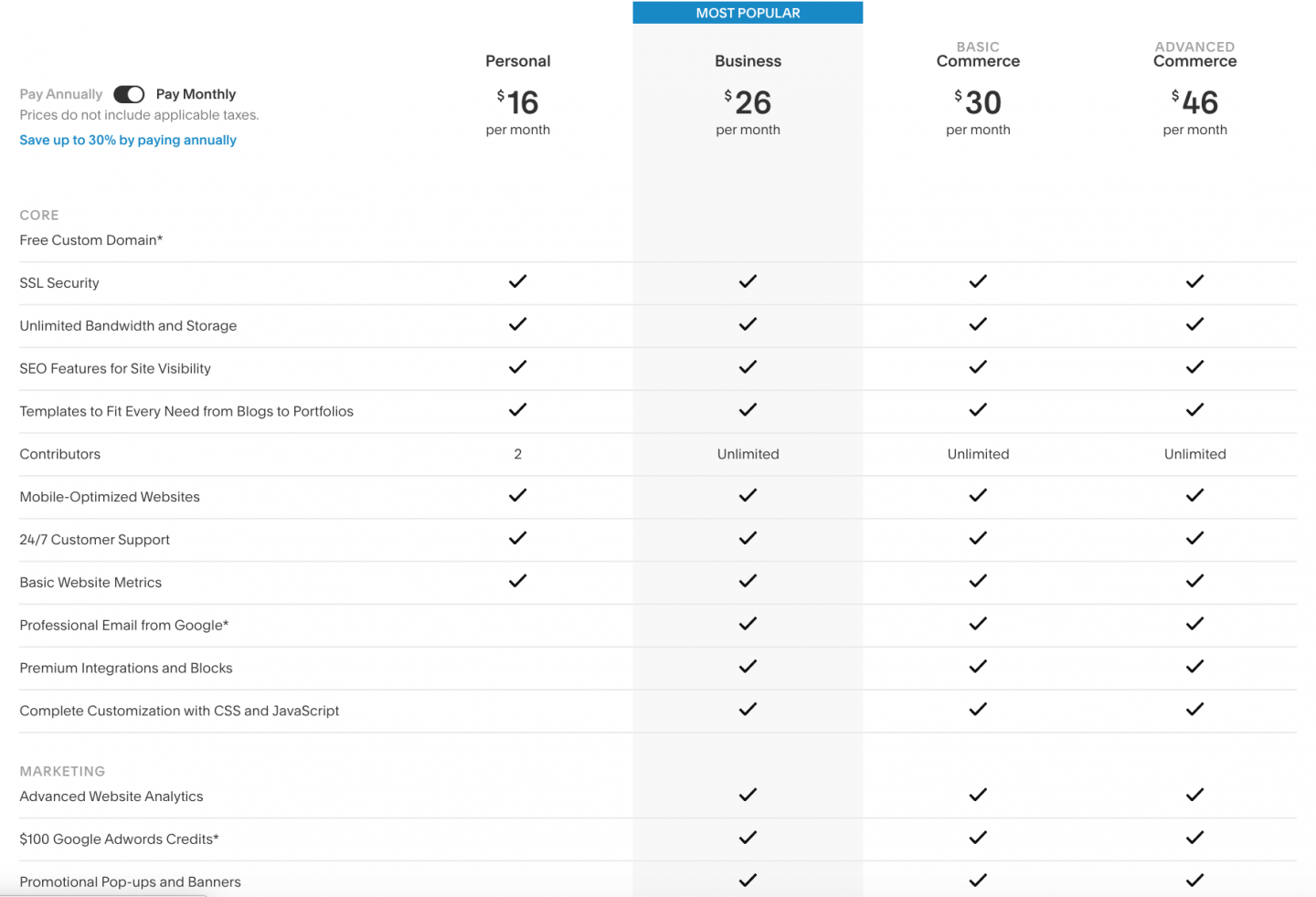
Credit: www.nerdwallet.com
WordPress: Benefits And Drawbacks
WordPress is one of the most popular website-building platforms. It offers a range of features, but it also has some challenges. Let’s explore its benefits and drawbacks.
Versatility
WordPress is incredibly versatile. You can create various types of websites with it. For instance, blogs, eCommerce sites, and portfolios. It has thousands of plugins and themes. This allows you to customize your site easily.
With these plugins, you can add various functionalities. For example, SEO tools, contact forms, and social media integrations. The versatility makes WordPress a top choice for many.
Learning Curve
The learning curve for WordPress can be steep. It is not as user-friendly as some other platforms. Beginners might find it overwhelming.
You need to understand some technical aspects. For example, hosting, domains, and security. Even installing plugins and themes requires some knowledge. This can be challenging for non-tech-savvy users.
Maintenance Costs
Maintenance costs can add up with WordPress. You need to pay for web hosting. This is a recurring cost. Some premium themes and plugins also come with costs.
Regular updates are necessary for security. This might require hiring a developer. The overall maintenance can be more expensive compared to other platforms.
Comparing User Interfaces
Choosing the right website builder can be tough. Each platform has its own strengths. Let’s compare the user interfaces of Squarespace, Wix, and WordPress. We will look at intuitiveness and customization levels.
Intuitiveness
Squarespace has a clean and modern interface. It is easy to navigate. The drag-and-drop builder is user-friendly. Even beginners can create beautiful websites.
Wix offers an intuitive drag-and-drop editor. It provides a lot of guidance. Users can see changes in real-time. It is ideal for those new to website building.
WordPress has a steeper learning curve. The interface is not as intuitive. Users need some technical knowledge. It is powerful but can be confusing for beginners.
Customization Levels
Squarespace offers limited customization. Users can change templates and design elements. But, it has fewer options than WordPress. It is suitable for those who want a straightforward process.
Wix provides a lot of customization. Users can tweak many design elements. The editor is flexible. It is great for those who want more control over design.
WordPress is the king of customization. Users can use plugins and themes. It allows for extensive modifications. It is perfect for those who need a highly customized site.
| Platform | Intuitiveness | Customization Levels |
|---|---|---|
| Squarespace | High | Moderate |
| Wix | High | High |
| WordPress | Low | Very High |
Each platform has its own merits. Consider your needs before choosing one. Squarespace is straightforward. Wix offers flexibility. WordPress provides deep customization.
Design And Templates
Design and templates are crucial aspects of a website builder. They determine your site’s look and feel. Squarespace, Wix, and WordPress offer different options in design and templates. Let’s explore their offerings in more detail.
Template Variety
Squarespace offers a curated selection of templates. Each template is designed by professionals. They focus on modern and clean designs. The number of templates is limited but high-quality. This makes it easy to find something that stands out.
Wix provides a vast array of templates. You can find templates for almost any niche. The templates range from simple to complex. You can customize them to fit your needs. This gives you more freedom to create a unique site.
WordPress offers thousands of themes. Many are free, while others are premium. The themes range from simple blogs to complex e-commerce sites. You can also create custom themes if you have coding skills. This makes WordPress highly flexible.
Responsive Design
Squarespace templates are fully responsive. They adjust to any screen size. This ensures your site looks good on all devices. No extra work needed from your side.
Wix offers mobile optimization for its templates. You can edit the mobile version separately. This gives you control over how your site appears on mobile devices. It may require extra effort to ensure everything looks right.
WordPress themes vary in responsiveness. Many modern themes are mobile-friendly. Always check if a theme is responsive before you use it. You may need plugins to enhance mobile performance.
E-commerce Capabilities
Squarespace, Wix, and WordPress are popular website builders. Each offers unique e-commerce capabilities. Understanding these can help choose the right platform for your online store.
Built-in Features
Squarespace offers a range of built-in e-commerce features. It includes product management, inventory tracking, and sales analytics. The platform also supports multiple payment gateways and has a user-friendly interface.
Wix provides a variety of built-in e-commerce tools. These include product galleries, order management, and shipping options. Wix also supports various payment methods and offers a simple drag-and-drop editor.
WordPress has powerful e-commerce capabilities through plugins. The most popular is WooCommerce. WooCommerce offers extensive product management, inventory tracking, and sales reporting. It also supports multiple payment gateways.
Third-party Integrations
Squarespace integrates well with various third-party tools. These include Mailchimp, Xero, and ShipStation. These integrations enhance the platform’s e-commerce functionalities.
Wix offers numerous third-party integrations. Popular options are QuickBooks, Shippo, and Ecwid. These integrations expand Wix’s e-commerce capabilities.
WordPress stands out with its vast range of third-party integrations. WooCommerce alone integrates with countless tools and services. Examples include Stripe, PayPal, and Mailchimp.
| Platform | Built-in Features | Third-party Integrations |
|---|---|---|
| Squarespace | Product management, inventory tracking, sales analytics, multiple payment gateways | Mailchimp, Xero, ShipStation |
| Wix | Product galleries, order management, shipping options, various payment methods | QuickBooks, Shippo, Ecwid |
| WordPress | Extensive product management, inventory tracking, sales reporting, multiple payment gateways | Stripe, PayPal, Mailchimp |
Seo And Marketing Tools
Choosing the right website builder involves many factors. SEO and marketing tools are among the most crucial. Let’s see how Squarespace, Wix, and WordPress compare in this area.
Built-in Seo
Squarespace offers built-in SEO tools. You can edit meta titles, descriptions, and alt texts. It also generates clean URLs and provides automatic sitemaps.
Wix includes a wide range of built-in SEO features. These include customizable meta tags, alt texts, and an SEO wizard. The wizard guides you through optimizing your site.
WordPress is renowned for its SEO capabilities. With plugins like Yoast SEO, you get advanced features. These include keyword analysis, readability checks, and XML sitemaps.
Marketing Integrations
Squarespace integrates well with several marketing tools. It has built-in email campaigns and social media integrations. You can also connect Google Analytics and Facebook Pixel easily.
Wix offers extensive marketing integrations. It includes email marketing tools, social media management, and Google Analytics. You can also use apps from the Wix App Market to enhance functionality.
WordPress excels in marketing integrations. It supports plugins for email marketing, social media, and analytics. Popular options include Mailchimp, Hootsuite, and Google Analytics.
| Platform | Built-in SEO | Marketing Integrations |
|---|---|---|
| Squarespace | Meta tags, alt texts, clean URLs, sitemaps | Email campaigns, social media, Google Analytics |
| Wix | Meta tags, alt texts, SEO wizard | Email marketing, social media, Google Analytics |
| WordPress | Advanced plugins, keyword analysis, sitemaps | Email marketing, social media, Google Analytics |
Each platform offers robust SEO and marketing tools. Your choice will depend on your specific needs and preferences.
Customer Support And Resources
Choosing the right website builder means looking at customer support and resources. This area can make a big difference in your experience. Let’s compare Squarespace, Wix, and WordPress.
Support Channels
Squarespace offers 24/7 email support and live chat during business hours. They also have a community forum. No phone support available.
Wix provides 24/7 support through email and phone. Live chat is available for premium users. They have a large help center and community forum.
WordPress support varies. WordPress.com offers 24/7 live chat and email for premium users. WordPress.org relies on community forums and documentation. No direct support for the free version.
Learning Materials
All three platforms offer learning materials to help users.
- Squarespace: Offers a comprehensive knowledge base, video tutorials, and webinars.
- Wix: Provides a vast help center, video tutorials, and a blog with tips.
- WordPress: Has extensive documentation, community forums, and many third-party tutorials.
| Platform | Email Support | Live Chat | Phone Support | Community Forum |
|---|---|---|---|---|
| Squarespace | Yes | Yes (Business hours) | No | Yes |
| Wix | Yes | Yes (Premium) | Yes | Yes |
| WordPress | Yes (Premium) | Yes (Premium) | No | Yes |
Conclusion And Final Recommendation
Choosing the right website builder is crucial. Squarespace, Wix, and WordPress offer unique advantages. Your choice depends on your needs and skill level. Here’s a breakdown to help you decide.
Best For Beginners
Squarespace is great for beginners. It has an intuitive drag-and-drop interface. Users can create beautiful websites without coding. Squarespace also offers excellent customer support.
Wix is another option for beginners. It provides a simple, user-friendly interface. Wix has many templates and a flexible editor. Users can easily build and customize their sites.
| Platform | Ease of Use | Support |
|---|---|---|
| Squarespace | High | Excellent |
| Wix | High | Good |
| WordPress | Moderate | Community-based |
Best For Customization
WordPress shines in customization. It offers thousands of themes and plugins. Users can tailor their site to their exact needs. WordPress also supports custom coding.
Wix allows some customization. Its editor is flexible and provides various design options. But it doesn’t match the depth of WordPress.
Squarespace has limited customization. Its templates are beautiful but less flexible. It’s ideal for users who prefer a set design framework.
- WordPress: Most customizable with plugins and coding.
- Wix: Good flexibility but limited compared to WordPress.
- Squarespace: Beautiful but less flexible templates.
Best For Budget
WordPress is budget-friendly. It’s free to use, but you need hosting. Many affordable hosting options are available. Users can find plugins and themes for free or low cost.
Wix offers a free plan with ads. Paid plans start at a low cost. It’s a good balance between features and price.
Squarespace is more expensive. It includes hosting and features in its plans. Users get value for the price but pay more upfront.
- WordPress: Free, pay for hosting.
- Wix: Free plan available, affordable paid plans.
- Squarespace: Higher cost, all-inclusive.
Frequently Asked Questions
What Are The Main Differences Between Squarespace, Wix, And WordPress?
Squarespace, Wix, and WordPress differ in customization, ease of use, and flexibility. Squarespace is user-friendly with beautiful templates. Wix offers drag-and-drop simplicity. WordPress is highly customizable but requires more technical knowledge.
Which Platform Is Best For Beginners?
Wix is best for beginners due to its intuitive drag-and-drop interface. Squarespace is also user-friendly but offers less flexibility. WordPress has a steeper learning curve.
Can You Transfer A Site From Wix To WordPress?
Yes, you can transfer a site from Wix to WordPress. However, it requires manual exporting of content. This process can be time-consuming and may require technical assistance.
Is WordPress Good For Ecommerce?
Yes, WordPress is good for eCommerce. It offers numerous plugins like WooCommerce. These plugins provide extensive features and customization for an online store.
Conclusion
Choosing between Squarespace, Wix, and WordPress depends on your needs. Squarespace offers sleek designs. Wix provides user-friendly customization. WordPress excels in flexibility and scalability. Consider your skills and goals. Each platform has strengths. Think about your priorities. Ease of use?
Design options? Customization? Make a choice that fits your project. Happy website building!
